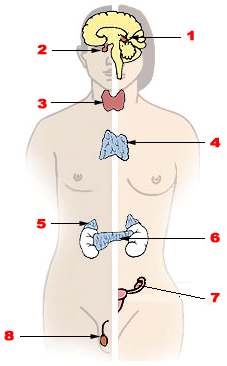About Endocrinology
The Endocrine System
This is the system that helps the body communicate, control and coordinate various functions. It works collaboratively with other systems in the body, including the nervous system, the reproductive system, liver, gut, pancreas and kidneys.
The eight major glands that help in the functioning of the endocrine system include:

(Male, left; female, right)
1) Pineal gland
2) Pituitary gland
3) Thyroid gland
4) Thymus
5) Adrenal gland
6) Pancreas
7) Ovary
8)Testes
SOURCE: Wikipedia, http://en.wikipedia.org/wiki/Endocrine_diseases.
Each gland secretes a different hormone that may have one or many specific functions affecting a different body process, including:
- Growth and development
- Energy level
- Metabolism
- Sexual function
- Reproduction
- Mood
- Stress and injury response
- Bone and muscle strength
When one or more of the organs stops functioning or functions abnormally, it sends the normal functioning of other systems and organs off balance leading to diseases and disorders, as well as to over or underproduction of hormones that cause hormonal imbalance.
Risk factors
Everyone's body undergoes changes, some natural and some not, that can affect the way the endocrine system works. Some of these factors include:
- Aging
- Genetics
- Stress
- Certain diseases and conditions
- Environmental factors
Symptoms
Endocrine disorders can produce a wide variety of symptoms: rapid weight loss, rapid weight gain, loss of appetite, body pain, extreme fatigue or even an overall “sluggish” feeling.
Symptoms may be mild or even non-existing. In extreme cases, symptoms may be life-threatening, including:
- Confusion or loss of consciousness for even a brief moment
- Dangerously low blood pressure
- Dangerously slow heart rate
- Dehydration
- Depression or anxiety
- Difficulty breathing
- Eye problems, including dryness, irritation, pressure, pain or bulging
- Severe fatigue or weakness
- Severe, unexplained headache
- Severe vomiting and diarrhea
- Sleep disturbances
If you are experiencing any life-threatening symptoms, seek emergency treatment as soon as possible.
.png?la=en&h=800&w=800&hash=A6D790C87E681BDDC207884DD1839C2D)
Diagnosis
To diagnose an endocrine disorder properly, your doctor will need to conduct a complete family medical history and a physical examination. An accurate diagnosis of your disorder can only occur when your physician has ruled out other disorders or medical conditions, or medications, which may be causing or aggravating the condition. Your physician may then refer you to an endocrinologist for more extensive testing to develop a treatment plan for your specific condition.
Tests that your endocrinologist may perform include:
- Blood tests
- Urine test
- Saliva test
- Glucose tolerance test
- Imaging tests: X-rays, CT scans, MRI, sonography
- Ultrasound
Resources

Thyroid disease 101: Early diagnosis and treatment are key to preventing serious complications

Signs of Thyroid Disease That You Should Get Checked Immediately

What Do I Need To Know About Low Testosterone Or Low-T
Treatment
Endocrine disorders are typically treated by increasing or reducing the hormone which has become imbalanced either through hormone supplements or medication. In some cases, surgery may be necessary.At Summa Health, you'll have access to the latest surgical techniques, including minimally invasive, robotic-assisted surgery which is often used for the removal of the adrenal glands. The minimally invasive technique allows surgeons to safely perform delicate and complex procedures while providing patients such benefits as less post-operative pain, faster recovery times, less bleeding and less scarring. Minimally invasive robotic surgery may not be the best option for everyone. Your physician can determine whether you’re a good candidate for this type of surgery.
Read more about Summa's use of the daVinci robotic-assisted system for minimally invasive surgery.
To schedule an appointment with a Summa physician to discuss your symptoms and determine if you have an endocrine disorder call 800.237.8662.
Services
Disorders
There are a number of disorders that may develop if a gland in the endocrine system malfunctions. For example, if your pancreas malfunctions, you may develop diabetes, the most common disorder of the endocrine system. If your thyroid malfunctions, you may develop a goiter or hyperthyroidism (a very fast metabolism), which won't allow you to gain weight, or hypothyroidism (a slow metabolism), which can cause obesity. If the thymus malfunctions, your immune system may be affected. You may develop a sleep disorder or depression if you have a malfunctioning pineal gland. A malfunctioning pituitary gland can cause gigantism (abnormally large size) or dwarfism (proportionately small size). If your ovaries or testes malfunction, this can lead to sterility, breast development or facial hair growth.
A few of the other disorders caused by an endocrine system imbalance include:
- Addison's Disease
- Amenorrhea
- Conn's syndrome
- Cushing's Disease
- Diabetes
- Gigantism
- Glucagonoma
- Intersex
- Hypoglycemia
- Thyroid Cancer
- Osteoporosis
- Paget's Disease of the Bone
- Polycystic Ovary Syndrome
- Puberty (Delayed)
- Puberty (Precocious)
Meet The Team

Meet Our Team
Locations
To schedule an appointment at one of our locations, please call 234.312.2111.
Featuring a board-certified physician and advanced practice registered nurses, as well onsite point-of-care lab testing (such as strep, flu, and urinalysis) services and digital X-ray, Summa Health Fairlawn Urgent Care provides fast and easy access to medical care for common health concerns.
This urgent care location provides non-emergency care with convenient evening and weekend hours. We’re here for you when you are unable to see your primary care provider.
No appointment necessary for urgent care services.
Akron - Park West
1 Park West Boulevard, Suite 350
Akron, OH 44320
View on map.
Akron Campus
95 Arch, Suite 270
Akron, OH 44304
View on map.
Barberton Campus
155 5th St NE, Suite 102
Barberton, OH 44203
View on map.
Chapel Hill
1260 Independence Avenue
Akron, OH 44310
View on map.
Green
1790 Graybill Rd, Suite 200
Uniontown, OH 44685
View on map.
